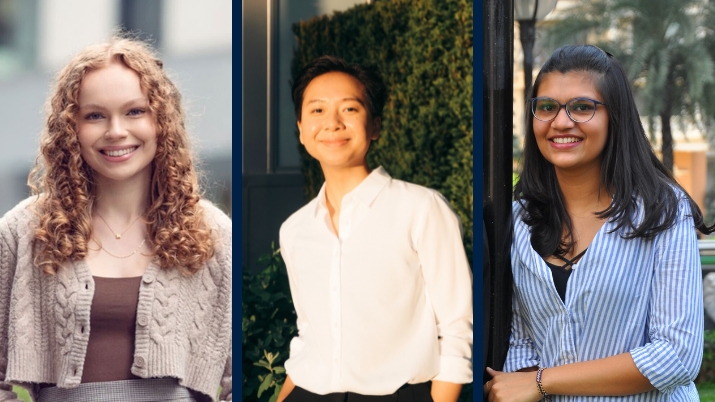

(From L-R): Madi Renner, Fides Arguelles, Khushi Mehta
As the whirlwind of UBC graduation dies down, and the current undergraduate students march closer to their time to cross the stage, we thought we should ask the Class of 2023 some of the burning questions of the current student populous.
Madi Renner, Fides Arguelles, and Khushi Mehta sit down with us to give us an insight into the ins and outs of being a UBC Psychology student!
What is a controversial piece of advice you would give to someone getting a degree in Psychology?
MR: Take courses outside of just Psychology! University is such an incredible time to expand your horizons academically, professionally, and as a person — don’t limit yourself to just your major or intended field of study. Some of my best experiences in university came from taking courses across various disciplines, and noticing linkages between different fields of study, and how they strive to explain common issues we face as humans.
FA: You don’t need to love psychology to be in. Even as the field has evolved to consider the experiences of IBPOC and 2SLGBTQIA+ folks, many practices in research, teaching, and treatment still continue to – whether directly or indirectly – uphold systems of oppression. But it isn’t wrong to feel frustrated or become discontent – this exactly reflects the awareness that these systems in place were not made for people like us in mind. This only underlines the importance of prioritizing space for historically marginalized communities in our classrooms, labs, and clinics for the future and betterment of psychology.
KM: It’s okay to not be interested in research! Psychology is such a large, rich field. Yes, we definitely need more diverse researchers, but if you are not interested in it, that’s okay. I felt such a pressure to be involved in labs, do honours, publish work, but I realized that while I loved helping out researchers, and learning about how to do it, I did not actually want to do research. I found my community soon enough, but it felt alienating at first. It’s okay to be interested in learning the skills associated with a B.A. in psychology, while not necessarily pursuing research as a career.
Did something about your time at UBC / in higher education surprise you?
MR: I was surprised by the number of times my path changed — from changing career goals, to changing majors, to even changing in many ways as a person. It was very comforting to know though that I was surrounded by people going through the same/similar changes, and that this is a normal part of university (and life).
FA: I never expected to grow into the community here and with that, learn how deeply collaborative our student and research spaces are. From my experience in the honours program, Psi Chi, and different psychology labs, I’ve gained mentors and friends who I hope to stay connected with beyond my undergraduate years!
KM: Professors are truly your best friend. In India, there is always a large gap between the teacher and the student. I approached professor-student relationships the same way, but I eventually realized that they want to connect with their students. They want to talk about their research, work, experiences, and are a treasure trove of advice from someone who has directly been where you are.
If you could go back and give your first-year self some advice, what would it be?
MR: To just breathe and trust that things will end up alright. One ‘bad’ grade in your first year won’t ruin your academic career, taking a course that you end up not liking, or pursuing an extracurricular and realizing it isn’t for you is not a bad thing — it is all part of your journey and an important redirection in pursuit of finding the things that you are genuinely passionate about, and discovering where your skills lie. Your university experience doesn’t have to be ‘perfect’ in order for it to be the right journey for you.
FA: Someone recently told me that sometimes the most radical thing you can do is let yourself down. This message goes out to all my fellow students with Queer, IBPOC, or any marginalized identities who may have come to learn that we are expected exceptionalism, if not perfection in order to hold space, to be heard, or to advocate for ourselves. I am definitely someone who had to put effort into unlearning this need for perfection. So, I would have liked to hear, as early in my degree, that I deserve respect, compassion, and opportunity regardless of my imperfections. Perhaps with this in mind, I would’ve been a bit less afraid of making mistakes and letting myself down every once in a while. Maybe then, I could have afforded to be much more compassionate to myself.
KM: It’s okay to not be the smartest in the room. I work so hard to always know everything, and be perfect at every skill I try, but there is something so profound in asking someone: “What is that? Can you tell me more about what you just said. This is the first time I am hearing of it!” You are a student, you shouldn’t be expected to know everything. Perhaps this is silly, but I spent so much time trying to be the smartest in the room, that I forgot to make genuine connections with my peers around me.
What were some of your fears, if any, while beginning your degree at UBC? How did you face/ overcome them?
MR: One of my fears was that I wouldn’t find the right fit for me between fields of study and a sense of community at the school. While it has definitely been a process of trial and error, I feel like I truly found my space at UBC over time.
FA: I definitely remember feeling overwhelmed when I first learned about the many steps it takes to practice as a psychologist. More so, I also remember several moments that led to me doubting my place in this field. While I have yet to overcome this sense of imposter syndrome, what has grounded me was the support, guidance, and advocacy from those around me. Throughout the years, they’ve given me the courage to navigate this broad field through various courses and research labs. Now, I’m able to say I’ve finally come to find my niche in clinical research regarding minority stress and mental health!
KM: As childish, and Jane-Austen-esque this sounds, I feared that no person would romantically like me. I wanted to feel romantic love so desperately. As I met more people, and found deep, profound friendships, my focus shifted to forming meaningful platonic relations. In high school, my Spanish teacher would often tell me, that your partner will find you when you stop looking for them. I never believed it, but when I stopped trying so hard to appeal to people around me, I found the love of my life! Do what makes you feel good, not what might make you look good to others – that is the most attractive thing you can do.


